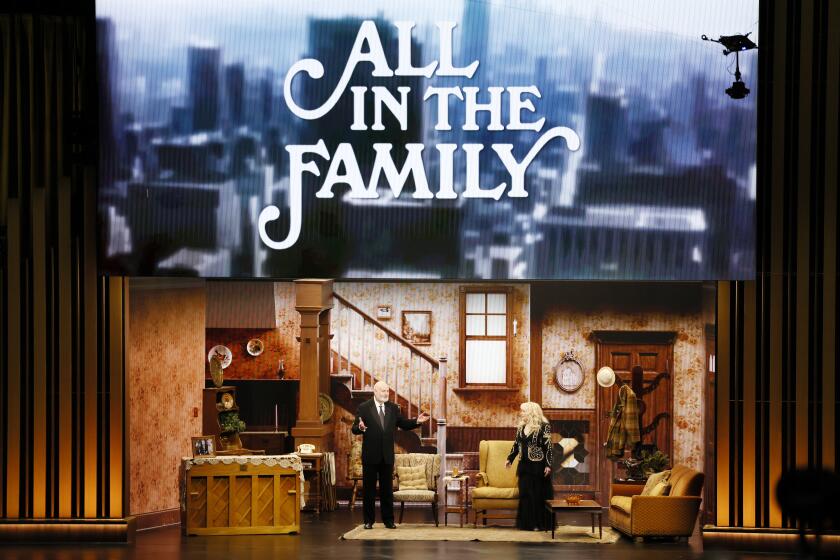Louis-Dreyfus Looks to Lay Down New Tracks
She waited for the right project, and in the meantime decompressed from the whirlwind of “Seinfeld.” She raised her two young kids (one born at the end of “Seinfeld’s” eighth season) and put some distance between herself and TV stardom, between people wanting her to be Elaine Benes, one of the four principal characters on the biggest hit in TV history. Networks and studios, of course, were interested in developing a series for her. “That was scary to me,” says Julia Louis-Dreyfus. “One has to be careful in making these deals, because the next thing you know you’re making something you don’t want to do.”
In the interim, Michael Richards, another “Seinfeld” co-star, came back as a bumbling private detective in NBC’s “The Michael Richards Show,” and this season on ABC Jason Alexander, formerly the schlumpy ne’er-do-well George Costanza, is “Bob Patterson,” motivational speaker.
Richards flopped and Alexander is flailing--the latter confounding ABC executives, who have watched as a major television star is unable to draw a big audience to his show, even just once (this week, “Bob Patterson’s” audience dwindled to just over 7 million viewers, fifth in its time slot).
Whether or not this has anything to do with the prospects for “22 Minutes With Eleanor Riggs,” the NBC series in which Louis-Dreyfus will star as a nightclub singer, is for the cynics to determine. And there are plenty of those.
“My best bet is not to say anything,” Louis-Dreyfus says, at the mention of a perceived “Seinfeld” albatross.
NBC announced this week that they are picking up 12 episodes of tentatively titled “22 Minutes With Eleanor Riggs,” which is scheduled to debut in March after NBC’s coverage of the 2002 Winter Olympic Games. In the series, a filmed, single-camera comedy with no laugh track, created by Louis-Dreyfus’ husband, Brad Hall, the actress plays a club singer and single woman living in Los Angeles who brings in money doing jingle work. The show plays out in real time--each episode involves the 22 minutes of the title. Louis-Dreyfus herself will be singing in the show--jazz standards, bossa nova.
Those who have seen the pilot (Bryan Lourd, one of Louis-Dreyfus’ agents; NBC officials; “Seinfeld” co-creator Larry David) extol its quality, its risk-taking. If Richards and Alexander repositioned themselves in broad sitcoms in which they played people who were sort of like Kramer and George, Louis-Dreyfus is out on more of a limb. The pilot episode finds Ellie in her apartment, in bra and slip, getting ready for a club date. She is running late. Her sister calls. The toilet overflows. She goes for help, but the elevator is out of order. Etcetera.
There is a grimness to her life, but nothing too grim. “She has a dream that she’s not quite fulfilled,” Louis-Dreyfus says of the character. “I know a lot of people like this. People who get by. She’s not at the bottom, she’s not at the top, she’s at the gray area. That’s what life is about.”
For NBC, “22 Minutes With Eleanor Riggs” is a gamble, but one that’s at least attached to a sought-after television star and a 40-year-old actress whose combination of talents no one doubts. Buying “Eleanor Riggs” is among the gambits taken by Jeff Zucker in his first full season as NBC’s entertainment chief. Other fliers--putting a chef, Emeril Lagasse, in a sitcom, for instance--have been harder to defend. Zucker has repeatedly indicated that he wants to rebrand NBC as the home of quality comedies, to restore some of the luster after such recent knee-slappers as “Cursed,” “Jesse” and “Veronica’s Closet.” To that end, the network swells with pride over the sophisticated-looking dramedy “Ed,” and this season’s new comedy “Scrubs,” which follows a harried young doctor doing his hospital internship.
“There were some initial concerns about the format,” Zucker says of discussions within NBC about “Eleanor Riggs.” “There were no concerns about Julia. There were some initial questions and concerns [about], was the real-time aspect going to work? And I think we have sufficiently proven in the pilot and subsequent discussions that it can work and we won’t be bound by it.”
Hall doesn’t see the real-time approach as a device, but as a way to get a “fly-on-the-wall,” intimate look at a character, played by a multifaceted actress. “Eleanor Riggs” is a husband-and-wife project, but not the first time Hall and Louis-Dreyfus have worked together. They met in the early 1980s, when both were Northwestern University students; Hall was running the Practical Theater Company (what he calls “off-Loop theater”) and hired Louis-Dreyfus to be in one of his shows. Soon after, they were cast mates on “Saturday Night Live,” during the somewhat forgettable years of 1982-84.
Two decades later Louis-Dreyfus is a celebrity and Hall has lived the strange but lucrative sitcom writer’s life, where you forsake your art but get blown sideways into money. He has written unproduced pilots under a succession of multimillion-dollar development deals and done film adaptations, because he wanted to, of two books by novelist Paul Micou. Within TV industry circles, he is best known for having created and executive-produced “The Single Guy,” a much-maligned sitcom that ran on NBC from 1995-97, and for being married to Louis-Dreyfus.
“I think the fact that I’m married to Julia, people like to take shots at me,” he says. “I’m used to it.”
Hall finished “22 Minutes With Eleanor Riggs” last December, and only then did he show it to his wife, he says. “There was no [development] deal, there was no money, no nothing,” he says of his impetus to write the pilot. By then, Louis-Dreyfus was ready to do a series again. “He and I have had conversations in the past about, how do you reinvent this?” Louis-Dreyfus says of the need to present television comedy in a new form. “Eleanor Riggs,” she says, was not born out of those conversations. “This script was definitely a surprise to me when I read it.”
Free agents, the couple took the script to all the major broadcast networks and HBO early this year. HBO passed, and while networks were intrigued by the possibility of landing Louis-Dreyfus, they were taken aback by the haughty-seeming caveats attached to the project: The episodes would run commercial-free, notes from executives would be limited to one spokesperson, and they would produce only 15 episodes a season, not the standard grind of 22.
“The main thing Julia and I were trying to set up together is an environment that’s happy,” says Hall. “We don’t want to be noted to death, but at the same time, that doesn’t mean we don’t want input. I’ve had situations before where there are more people giving notes than there are writers on the show.
”... I gave them the script for free, so I thought maybe the trade-off was to have a clean way to talk about creative issues with the show. They could have 1,000 people giving notes, but give them all to one person and that person can give them to me.”
Sources say Louis-Dreyfus and Hall won’t be getting a show that airs without commercials, and that the request to limit note-giving also won’t be met.
Hall says he and Louis-Dreyfus were simply trying to ensure that the show the network bought would end up being the show that was produced. To that end, both say, they were reassured by Zucker’s enthusiasm for the project. The series is being produced by Carsey-Werner-Mandabach, each of whom will take executive producer titles along with Hall.
“We’ve both been in situations where shows got manhandled, and the central concept of the show was changed,” says Hall. “No one remembers this because it’s the whipping boy, but [“The Single Guy”] was very well-reviewed and watched, and then the central concept became attacked by the very people who were putting it on. And then the next thing you know you’re running in fear, and everyone stops being funny.”
Louis-Dreyfus puts it this way: “I didn’t want to find myself in the position of, ‘Here’s the premise,’ and six months later I’m sitting on a couch and it’s [a standard sitcom].”
Neither Louis-Dreyfus nor Hall want to delve into the implications about audience loyalty to “Seinfeld”--a show that is still on the air across the country six nights a week. Louis-Dreyfus doesn’t much want to talk about “Seinfeld” at all. Hall says: “The casualness with which people say hello to Julia on the street is hilarious to me.”
Richards and Alexander had this familiarity going for them, too, but the notion that none of the supporting players can carry a show of their own--that there is something like a “Seinfeld” curse--has been perpetuated by “The Michael Richards Show” and “Bob Patterson.” Both came on the air hounded by bad press. Both, too, featured Richards and Alexander not only as actors but as executive producers in a position to assure that writers acquiesced to their vision.
“The press was so rooting against this show, from the minute we announced the show,” says Jeff Bader, ABC Entertainment executive vice president, of “Bob Patterson.” “The ‘Seinfeld’ curse--it became a self-fulfilling prophecy.”
The rabble drowned out the test audiences, who are telling ABC they like the show, Bader says. But alongside his other theories about “Bob Patterson”--including that the show’s promotion was superceded by the sobering events of Sept. 11--is another, more self-evident one, as noted by many critics: The show isn’t good. Similarly, Richards squandered his Kramer cache in a show that quickly betrayed how overwhelmed he was behind the scenes.
Representatives of 20th Century Fox Television, the studio that produces “Bob Patterson,” and Alexander himself declined comment for this story. ABC last week announced that it was moving “Bob Patterson” from Tuesdays at 9, where it was losing badly to NBC’s “Frasier,” to Wednesdays at 9:30, after “The Drew Carey Show.”
Such maneuvering suggests that what ails “Bob Patterson” isn’t content, it’s marketing. This is an available form of denial for networks looking to jump-start shows.
“You can’t get around this quality problem,” says Peter Mehlman, a “Seinfeld’ writer for seven seasons. “I actually think that playing another character after George, Elaine and Kramer isn’t as hard as doing another character that’s not conceived by Larry David and Jerry Seinfeld.”
Seinfeld is resting on his sitcom laurels and reinvesting himself in stand-up. David, meanwhile, is in his second season as the auteur of “Curb Your Enthusiasm,” an improvised series on HBO in which he plays himself--the co-creator of “Seinfeld” who gets himself into silly beefs and awkward moments, only on camera this time.
Both Alexander and Louis-Dreyfus did guest spots on “Curb” this season, playing “Seinfeld” stars who get pulled back into the David vortex (he thinks they should follow up “Seinfeld” with a sitcom about how no one wants to see them in anything but “Seinfeld”).
In show business, joking about one’s image problem is one way to confront and demystify what people are saying about you. The other way, the harder way, is to come up with a project that is good enough to shut them up.
“We were both like, Jesus God, should we take this on?” Louis-Dreyfus says of “22 Minutes With Eleanor Riggs.” “It felt kind of right. It felt kind of right.”
The complete guide to home viewing
Get Screen Gab for everything about the TV shows and streaming movies everyone’s talking about.
You may occasionally receive promotional content from the Los Angeles Times.



